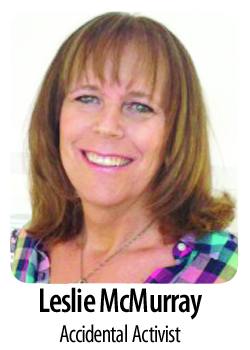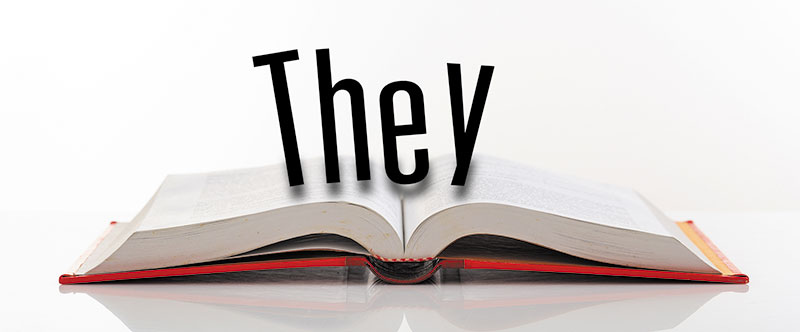 I was pleased to see recently that Merriam-Webster (the dictionary people) had chosen “they” as their “Word of The Year” for 2019. This particular usage is as a gender-neutral singular pronoun, often used by those who identify as nonbinary. It’s hard enough for those of us who are transgender to get those around us to get the pronouns right; for those who identify as nonbinary, it must be a nightmare.
I was pleased to see recently that Merriam-Webster (the dictionary people) had chosen “they” as their “Word of The Year” for 2019. This particular usage is as a gender-neutral singular pronoun, often used by those who identify as nonbinary. It’s hard enough for those of us who are transgender to get those around us to get the pronouns right; for those who identify as nonbinary, it must be a nightmare.
Even having to explain the concept of nonbinary pronouns to, say, a grocery store checker who is trying to be polite and respectful but just wants to move the line along is hard. Do you just take the “sir” or “ma’am” and get on with your day?
I’ve been thinking about that a lot lately. I have been enjoying some time off from work over the holidays, and I spent time out running errands and picking up last-minute things for Christmas. This means a lot more interaction with clerks. I have also been more tuned in to just how pervasive identifying someone else by gender is.
I got my nails done over the weekend (one of life’s little pleasures), and although I’m a regular there, each time I come in I’m given a mini clipboard with a form asking for what services I want. This form also has my name on it. Still, I’m only referred to as “ma’am.” Not that I have any problem with it; it’s music to my ears. But why is it even necessary?
It’s everywhere!
 My wife Katie and I like to play golf, so I was at a golf shop looking at something I wanted to get her. The sales associate stepped up and said, “Yes ma’am, how can I help you?” I described what I was looking for, and as he showed it to me, he asked, “Is this for your husband?”
My wife Katie and I like to play golf, so I was at a golf shop looking at something I wanted to get her. The sales associate stepped up and said, “Yes ma’am, how can I help you?” I described what I was looking for, and as he showed it to me, he asked, “Is this for your husband?”
That’s a lot of assumptions for a short conversation with a stranger. Not only did he make a guess as to my gender identity, but he went on to take a guess as to my relationship status. He was only 50 right; that won’t even get you an invitation the Gator Bowl.
There was a nice, awkward silence when I corrected him: “No, it’s for my wife.” I imagine I would have really sent him into a spin if I’d told him that my wife and I are both transgender.
I can only imagine how a nonbinary customer would fare.
Why is this even necessary? I get that we want to be polite, but guessing at someone’s gender identity as a show of respect is pretty high risk for a pretty low reward. If you guess wrong, I’m going to remember you. I also won’t even feel safe coming back to your store.
It’s another risk to guess someone’s relationship status. For instance, when a clerk asks, “Is this for your husband,” there are any number of uncomfortable possible answers: “No, my husband just passed away on Thanksgiving. This is for my son.” “No, my husband cheated on me, and we were divorced just last week. This is for me.” “Yes; I’m hoping that playing more golf will distract him from his porn habit.”
Who it’s for? Nunya. If I volunteer that information, then let’s talk. But asking can be risky.
Maybe ask if this is for me? Women play golf, you know. If I volunteer that information, then you can ask questions about swing speed or handicap to make sure this is the right fit.
Where did gendering people as a greeting come from? The service industry especially is rife with gender-based assumptions. Why? If you get it wrong, you are all but guaranteeing a bad experience. As a trans woman, it would ruin my night. It would also ruin your tip and all but guarantee I won’t be back.
To me it seems as ridiculous as guessing someone’s religion by how they look, sound or dress: “Hello Catholic. Welcome to Snarky’s. Oh, you’re Episcopalian? I’m so sorry.” “Excuse me, could you show me to the little Lutherans’ room?”
Gender identity is considered legally protected medical information, so why is it relevant at Target?
I recently came across a restaurant in Toronto called “Hey Lucy’s” that has instructed staff to greet guests in a non-gendered manner. It’s a work in progress, but “Hey ladies” doesn’t fly. Their attitude is, “If you don’t know, don’t assume.” A customer shouldn’t have to share their gender identity in order to be served a meal.
A gender-neutral approach can not only be more respectful but also more profitable, too.
American Airlines realizes that as well, having just last week added nonbinary gender options when purchasing tickets. Maybe it’s time to ditch gender guessing and ask only if you really need to know, like if you’re my doctor.
Leslie McMurray, a transgender woman, is a former radio DJ who lives and works in Dallas. Read more of her blogs at lesliemichelle44.wordpress.com.
















I agree with most of what you say but the “they“ thing is not as easy to accommodate, because it twists the normal functioning of a language. If, for example, a non-binary person, who asks others to refer to him/her with plural pronouns, leaves the room, would you say “They were here a few minutes ago.“ Or would you say “They was here a few minutes ago.“ ??? Because if you choose the former (“They were here”), then you are not really using “They” to represent the singular. Instead, you are pretending that that which is singular is plural … and then matching both the plural pronoun and the plural verb accordingly. That is way beyond what anyone should ask others to do in speaking a well understood language. “They enjoys reading?” That’s using they as a singular pronoun, and sounds illiterate and, frankly, ridiculous. Sorry.
Sorry, I will not be using a plural form of a word to refer to someone.
I will always use someone’s preferred name, but this is ridiculous.
My trans friends all agree, this is a bit much. I always respect their gender identity. If their preferred pronoun is they/them, then I simply use their name. Instead of “they is over there” (which makes no sense), I use “John is over there”. Very simple without complicating things.
Quote from the article: “If you guess wrong, I’m going to remember you. I also won’t even feel safe coming back to your store.”
You feel unsafe because someone made a mistake? Grow up. Most people are reasonable and will apologize and use whatever pronouns you would like.
These types of things only lead to less acceptance and understanding from the general community.
It’s just like when I see the word latinx. There is grammatical gender in Spanish. All nouns have a masculine or feminine gender. I’m sorry but the entire language is not going to change. The only people I see using latinx are people who do not speak the language. It is complete appropriation. It’s disgusting.
Please respect languages. There are ways to respect gender identity without botching a language.